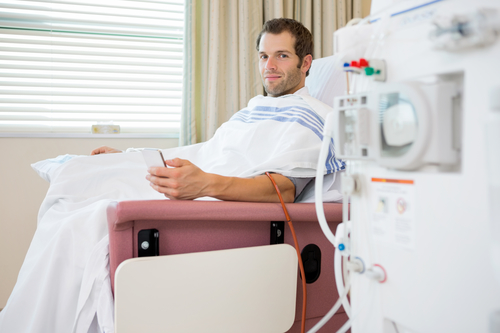
Kidneys are small fist-sized organs on either side of the abdomen that purify blood and help rid the body of waste. You might not be fully aware of the importance of your kidneys; but they play an important role in your body. From regulating blood pressure and mineral balances to regulating fluids to creating red blood cells; if your kidneys are impaired, your health and wellbeing will eventually be compromised.
Kidney dialysis is a common procedure designed to mimic the functionality of the kidneys. This life-saving treatment helps restore salts, removes waste and fluids in the blood; it additionally stabilizes blood pressure and helps the body reach a healthy balance.
Hemodialysis patients typically visit a treatment center three times per week and stay between 2-4 hours. According to The National Kidney Foundation, patients visit “a special building that is equipped with machines that perform the dialysis treatment. Additionally, the hemodialysis machine “adds the proper materials to purified water for the dialysis machines.”
Peritoneal Dialysis, inversely, relies on a catheter or a tube to clean the blood internally. Blood remains within arteries and veins while it is filtered and the impurities exit the body via the catheter.
Kidney damage signs include fatigue, frequent urination, itchy skin, tissue inflammation, excessive water retention, high blood potassium, shortness of breath, loss of appetite and anemia. Not all of these symptoms are present in all patients, and it is important not to assume that just because one or more of these symptoms are present that an individual needs kidney dialysis.
Proper kidney functionality is imperative to good health, mobility and longevity. When the kidneys are compromised, an individual’s waste will quickly build up within the bloodstream. Eventually, enough waste in the blood may lead to a coma or death.
Kidney dialysis helps treat:
At OCRC, we are working to help create a better future for those impacted by chronic kidney disease. We are currently in need of volunteers for our Kidney disease study.
Volunteer qualifications include:
Currently seeing a nephrologist and taking medicine such as Procrit® or Aranesp® for low blood count, or PhosLo® or Renagel® for high blood phosphorus
If you are interested in participating, please tell us a little more about yourself in the Contact section of the home page and we will respond to you to determine your eligibility for current and future studies.
